- Home
- Register Here
- Products
- Download Center
- Collaborative Learning
- Biology Activities
- Music Activities
- Chemistry Activities
- Geography Activities
- History Activities
- Ancient & Modern Olympics
- Ancient Greek and Modern Education
- Antisemitism and Anne Frank
- Arachne
- Aztec Tributes Game
- Catch the Plague
- Egypt Quiz
- Greek Farming
- Greek Gods Identity Parade
- Henry VIII's Six Wives
- Medieval Snakes and Ladders
- Perseus and the Gorgon
- Slave Rebellions
- Technology and the Wilsons
- Tudor Entertainments
- Underlying Causes of First World War
- Victorian Working Life
- WW2 Air Raids
- Literacy Activities
- Buri and the Marrow
- Classic Tales
- Collection
- Complex Sentences
- Compound Nouns
- Consonant Clusters
- Don’t Cry Sly Fox
- Double or Single Consonants
- Feelings Synonyms
- Frequent Words
- Giant Turnip Rhyming Words
- Greek Word Detective
- Haiku
- Holes - Louis Sachar
- Improving Adjectives
- It could have happened, but in fact it didn't
- Macbeth - Close Look at Act One
- Macbeth - Macbeth's Feelings
- Macbeth - Two Minute Autobiography
- Macbeth Connect Four
- Not Again Red Riding Hood (Lotto Game)
- Not Again Red Riding Hood (Track Game)
- Oliver Twist
- Plural Monsters Machine and "One or More than One" Spelling Game
- Prefix Connect Four
- Prefix Pairs
- Punctuation Game
- Silent Letters
- Simile Bingo
- Sufficient Suffixes
- Suffix Trees
- The Elves and the Shoemaker
- The Giant Turnip (Bingo Game)
- Too Many Apostrophes
- Vowels (Connect Four)
- Maths Activities
- 12 and 24 Hour Clock
- Adding Two Digit Numbers
- Battle for Angle Forest
- Bigger or Smaller than Half
- Book Mystery
- Buy a Bear
- Change
- Decimal Street
- Doubling Cards
- Football Scores
- Four In a Row
- Fraction Frolics
- How Much How Many
- Maths Vocabulary
- Measuring
- More or Less (10-100)
- More than, Less than
- Number Balance
- Number Bonds
- Perfect Paint Palette
- Probability
- Regular Polygons
- Shape Monsters
- Transformations
- PSHE Activites
- Physics Activities
- Download Activities
- Interactive Demo
- Videos & Instructions
Collaborative Learning : Physics Activities
| Title | Image |
|---|---|
Planets TalkDescription: Planets hold a fascination for many children and we have built on this interest to improve children's speaking and listening skills, as well as their ability to cooperate. Learning Outcomes: Pupils will be able to name and knowledge of some of their basic characteristics. |
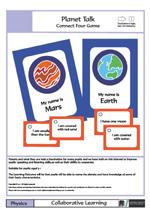 |
Planets MatchingDescription: The Planets Matching Game allows pupils to build on their knowledge of the planets as well as improve their speaking and listening skills. Learning Outcomes: Pupils will have increased their knowledge about the planets. |
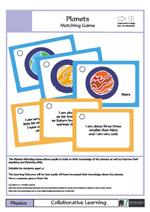 |
Energy ChainsDescription: Identifying different types of energy and how energy chains are formed is a fundamental part of physics. In these activities we are building on pupils’ knowledge of energy in a fun and collaborative way. Learning Outcomes: Pupils will be able to identify the different types of energy and demonstrate an understanding of how energy chains are formed. |
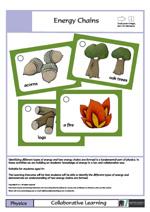 |
Push, Pull or Push and PullDescription: Identifying and classifying are important parts of all the sciences and here we have devised a fun way for younger children to start learning these processes. If you add different sets of cards please send them to the address below for expanding our library. Learning Outcomes: Pupils will be able to identify which kind of force is used for various activities. |
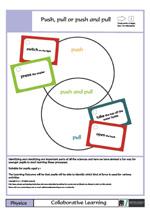 |
What's That Sound?Description: Differentiating between sounds to decide whether they are loud or quiet and high or low is a fun way of getting pupils to think and distinguish between sounds. Learning Outcomes: Pupils will have increased their knowledge about sound and will be able to give examples to demonstrate this. |
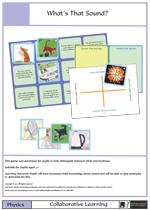 |
Energy and Sound DominoesDescription: This dominoes activity is designed to consolidate the spelling and meanings of scientific vocabulary.
Learning Outcomes: Students will be able to identify the different types of energy and sounds, and their meanings. |
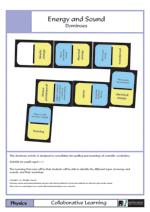 |
StabilityDescription: This game has been devised to help pupils to be able to generalise about stability (or instability), explain why some objects are more/less stable and compare the stability of different objects. Learning Outcomes: students will be aware of the stability and instability of certain objects and will be able to familiarise themselves with a language that involves comparison and qualifier. |
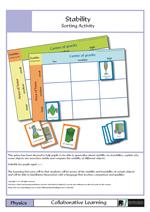 |

